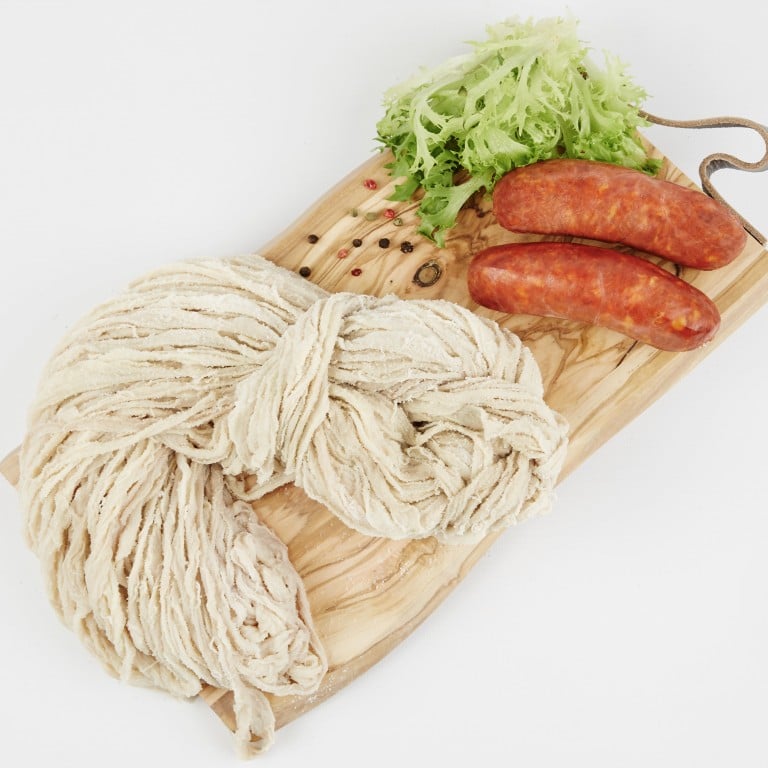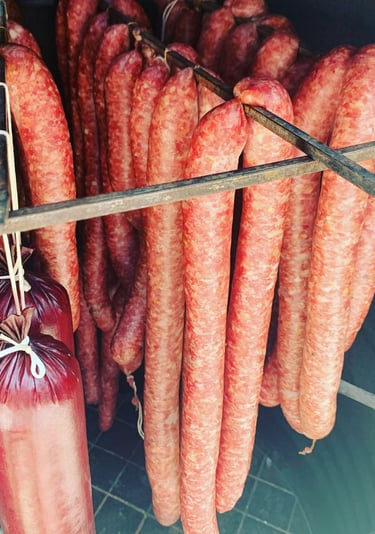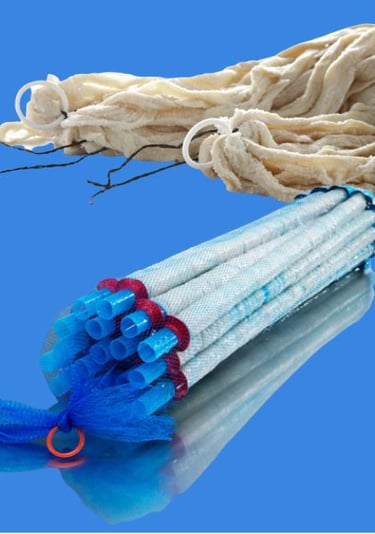"Aquab Casing Delivers with Flexible Payment Options (DA & COD) – DAP and Door-to-Door Worldwide!"
Sheep Casings Supplier Exporter
The Aquab sheep casings is one of Pakistan's renowned sheep casing suppliers and exporters.
The sheep Casing are obtained from animals' small intestines i.e. sheep and goat. The sheep are used to manufacture sausages and hot dogs. Sausages are one of the traditional and famous dishes such as for breakfast sausages, hot dogs, and snack sticks






Sheep casings are preferred for their tenderness and delicate bite, which is ideal for these types of sausages. They are valued for their natural appearance and texture, which enhances the overall eating experience.
The sheep casings contain decent calories, proteins, fats, and carbohydrates. The sheep casings are mainly composed of collagen and many other connective tissues. The sheep casing plays an important role in the manufacturing of sausage, therefore these casings are always in high demand due to their numerous benefits. Their natural origin, combined with their unique characteristics, contributes to the appeal and quality of the final product. However, sausages made with sheep casings are often high in several nutritional components, reflecting both the ingredients used in the sausage filling and the nature of the casing itself
Sheep casings play a vital role in the world of sausage manufacturing, offering numerous benefits that make them a preferred choice for many types of sausages. Their natural origin, combined with their unique characteristics, contributes to the appeal and quality of the final product. However, sausages made with sheep casings are often high in several nutritional components, reflecting both the ingredients used in the sausage filling and the nature of the casing itself. This essay explores the nutritional aspects of sausages manufactured with sheep casings, emphasizing their high content in certain nutrients.
Types of sheep casings in the market
Natural sheep casing
Collagen
Cellulose
Plastic casings
Natural sheep casing
Natural sheep casings are derived from the intestines of sheep and are widely used in sausage making due to their unique properties and traditional appeal
Collagen Casings
The artificial type of sheep casing is made from collagen in beef or pig hides, and the bones and tendons. The collages are proteins obtained from the tissue of animals for example beef or pig hides, sheep, bones and tendons. These types of casings are cheap in cost and have several benefits in making sausages, therefore collagen casings are widely used in the sausage-making industry.
Collagen used for artificial casings undergoes extensive processing and, before final production, resembles bread dough. It is extruded through a die to the desired diameter, then dried and shirred into short sticks up to 41 cm long, each containing up to 50 meters of casing. A newer method involves coextruding a dough-like substance with the meat mixture and treating the outside with a calcium solution to form a coating. Modern collagen casings are generally more tender than natural casings but lack the distinctive “snap” or “bite” of natural casing sausages. Most collagen casings are edible, but a thicker version is used for salamis and large sausages, where the casing is typically peeled off by the consumer. Collagen casings allow smoke and moisture to permeate, are less costly, offer better weight and size consistency, and are easier to handle compared to natural casings
Cellulose Casings
Cellulose casings, typically derived from materials like cotton linters or wood pulp, undergo a specialized process to create transparent and durable tubes used primarily in the production of wieners and franks. These casings are extruded into seamless tubes, often shirred for easy handling, and can be dyed to produce variations like "red hots". Post-cooking, the casing is easily removed, resulting in the popular "skinless" franks enjoyed by consumers.
For larger sausages such as bologna, cotto salami, and smoked ham, cellulose fibers are blended with wood pulp to form fibrous casings. These casings are permeable to smoke and water vapor, enhancing flavor during the smoking process. Depending on the application, cellulose casings are available in flat or shirred forms, and they are commonly treated with smoke, caramel color, or other additives to achieve desired surface qualities.
In essence, cellulose casings offer flexibility in sausage manufacturing, providing solutions for both classic "skinless" franks and larger deli-style products, all while allowing for customization through various treatments and coloring options.
Plastic casings
Plastic casings are typically extruded, following a process similar to other plastic manufacturing methods. These casings can be produced in flat or shirred forms. Unlike natural casings, plastic casings are impermeable to smoke and water, making them suitable for non-smoked sausage products where high production yields are expected.
In some plastic casing designs, the inner surface may be laminated or co-extruded with a polymer that has an affinity for meat proteins. This can cause the meat to adhere to the film, leading to some meat loss when the casing is peeled off. However, this approach often results in higher overall yields due to improved moisture control during processing.
Plastic casings have become less common in recent years due to concerns over potential health hazards associated with their use in food products. As a result, alternative casing materials that offer similar functional benefits without the perceived health risks are increasingly preferred in sausage production.
Qualities of Sheep Casings in the Market that are for sale
The sheep casing is measured with a diameter in mm, and mainly sheep casing involves four to five qualities of sheep casing.
To understand better let's first discuss between sheep and goat casings. The sheep casings are strong in material and are usually used in automatic fast sausage stuffers and these casings do not break easily. On the other hand, the goat casings are a little bet weak than sheep and can be broken while filling the sausage with automatic sausage stuffer
The sheep casing is differentiated during the selection step of sheep casing that we will discuss later the employer categorizes them according to their diameter, length, and quality.
IA Quality
Strong texture 99% sheep and 10 % goat, natural white color good smell no dark pieces Small pieces not less than 2Meter / 16 Ends / 90 Meters, 3Meter / 14Ends / 90 Meters & 5Meter / 12Ends / 90 Meters, here ends means the pieces.
AB Quality
Strong texture 60% sheep & 40% goat Pakistani material. Natural white color good smell no dark pieces Small pieces not less than 2 meters / 16-18 Ends / 90 Meters.
IB Quality
During the selection of Afghani material IB quality selected about 85% sheep and 15% goat casings. 2Meter / 16Ends / 90 Meter.
BC Quality
Receive During selection of Afghani and Pakistani material. Small pieces not less than 2Meter / 20-21Ends / 90 Meter. 1 or 2 pinholes are allowed in long pieces and small sprinkles in strong pieces. No fragile and blow-up spots in casings.
Short Pieces Quality
During selection of Afghani and Pakistani material. Small pieces not less than 2Meter / 20-21Ends / 90 Meter. 1 or 2 pinholes are allowed in long pieces and small sprinkles in strong pieces. No fragile and blow-up spots in casings.
History of Sheep Casing
The history of sausage stretches back millennia, intertwined with the evolution of human civilization. It's often credited to the Sumerians around 4000 BC, with references to cooked meat stuffed into animal stomachs resembling sausages found in Babylonian texts dating back 3,750 years. Chinese sausages, featuring goat and lamb meat, were recorded as early as 589 BC, while Greek poet Homer mentioned a form of blood sausage in the Odyssey, and playwright Epicharmus dedicated a comedy to "The Sausage" around 550-460 BC.
Sausage-making flourished in ancient Greece and Rome, becoming a staple across cultures and evolving over centuries. By the last millennium, it had become a revered craft, passed down through generations and adapted to local tastes and available ingredients. The Industrial Revolution in the 20th century revitalized sausage production, emphasizing efficiency and quality while meeting rigorous food safety standards.
Today, the global sausage industry boasts thousands of traditional and innovative varieties. While modern casings like collagen and cellulose have emerged to meet demand, natural casings remain the preferred choice among discerning chefs worldwide. They offer a unique authenticity and quality that reflects centuries of culinary heritage and craftsmanship, making them integral to the art and tradition of sausage-making.
Best Natural Sheep Casing Supplier Exporter In Pakistan
We Aquab Casing are one of the renowned sheep casing suppliers, our sheep casing mainly includes pure Afanistani sheep casing which is strong enough for automatic sausage stuffers. we are Halal certified and also follow all EU veterinary policies. Currency We successfully shipped 500+ shipments, you can get almost all qualities of sheep casing, with all sizes. All sheep casings are in pure whitish color with good texture.
Here are the qualities that we offer:
IA QUALITY, AB QUALITY, BC QUALITY AND SHORTS
16-18mm , 18-20mm, 20-22mm, 22-24mm, 24-26mm and 26-28mm.
You can also order custom lengths of sheep casing for example 90 Meters, 70 meters, and 50 meters.
You can also order a sample of sheep casing below:
Introduction to Natural Salted Sheep casing
info@aquabcasing.com
+923057608848
88/51C , Street 15 Usmanabad, Multan Pakistan
All Right Reserved by Aquab Casing @ 2023
Contact Us!
